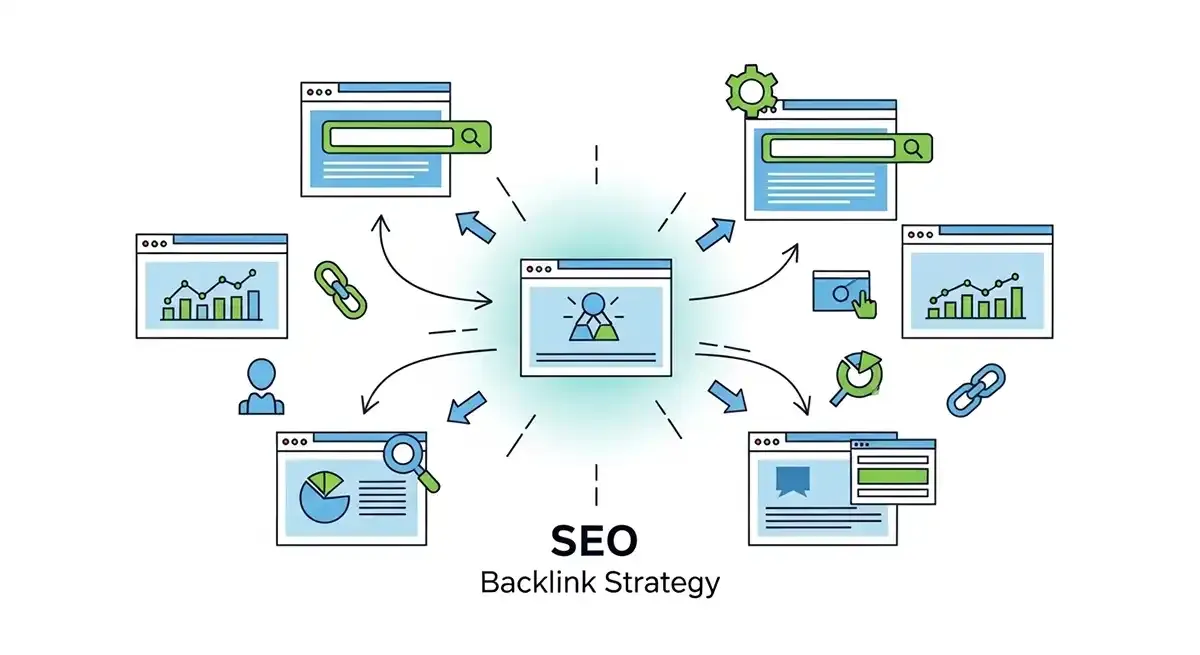Don’t underestimate the power of backlinks in your marketing strategy. Here's what you need to know about backlinking and why it's essential for boosting your domain authority.
In today’s competitive digital landscape, attracting new customers requires more than just a great product or service—you need to be visible. Search engine optimization (SEO) is a proven way to drive targeted traffic to your site by improving your rankings on search engine results pages (SERPs). But SEO isn’t always straightforward. For small business owners, understanding all the ranking factors that influence your position on SERPs can be challenging.
Among these factors, backlinks play a pivotal role. When other reputable websites link to your content, it signals to search engines like Google that your site is trustworthy and authoritative. Building a strong backlink profile is one of the most effective ways to improve your visibility in search results. The more high-quality backlinks you earn, the better your chances of ranking higher. So, what exactly is backlinking?
What Are Backlinks?
If you're new to SEO, you might be asking, "What exactly is a backlink?" Simply put, a backlink is a link from one website that points to a page on your own site. These incoming links are a core element of SEO, as they can significantly enhance your website’s visibility in search engine results by signaling credibility and relevance.
Backlinking is considered part of off-page SEO because it involves actions taken outside of your own website—unlike on-page SEO, which focuses on optimizing the content within your site. Think of backlinks as digital recommendations: when a reputable site links to yours, it's essentially vouching for the value of your content on a specific topic.
Search engines like Google use backlinks as a way to gauge the authority and relevance of a webpage. The more high-quality backlinks your site earns, the more trustworthy it appears to search engines. This can lead to higher rankings, increased visibility, and more organic traffic—making backlinking an essential part of any SEO strategy.
Why Are Backlinks Important?
Now that you know what backlinks are, it’s essential to understand why they matter. Backlinks are one of the most powerful tools for driving organic growth and improving your website’s visibility. If your goal is to rank on the first page of search engine results, building a strong backlink profile is a key competitive advantage.
Search engines like Google treat backlinks as endorsements—signals that other websites trust and value your content. The more high-quality backlinks you have, the more authoritative your site appears, which can help boost your rankings for relevant keywords. While backlinks alone won’t guarantee a top spot—factors like page speed and on-page SEO also play a role—they can significantly improve your chances.
Backlinks also make it easier for search engines to find and index your content. Since Google regularly revisits popular pages, a backlink from one of those sites can lead it straight to yours, helping your pages get discovered faster.
Another major benefit is referral traffic. When your link appears on a high-traffic, reputable site, readers may click through to learn more—bringing you qualified visitors who are already interested in your topic or niche.
Backlinks can also support your domain authority. While domain authority isn't a direct Google ranking factor, it’s widely used by SEO tools to assess a site’s overall strength. Monitoring your domain authority helps you track progress and benchmark your performance against competitors.
Moreover, backlinks are an effective way to boost brand awareness. Securing links from high-authority websites exposes your business to new audiences, increasing recognition and potentially driving more interest in your products or services.
Although backlinking is relatively straightforward, it requires a strategic, consistent approach. You don’t need to be an SEO expert to get started—but knowing what not to do is just as important.
Common Backlinking Mistakes to Avoid
- Buying backlinks – This violates Google’s guidelines and can result in penalties that hurt your rankings.
- Ignoring Google’s rules – Using manipulative or spammy practices can backfire and damage your site’s credibility.
- Overusing exact-match anchor text – Repeating the same keywords in your link text looks unnatural and can trigger search engine red flags.
Are There Disadvantages to Backlinking in Marketing?
Although backlinking is a vital component of SEO, it can do more harm than good if approached the wrong way. When not handled properly, backlink building can backfire—hurting your rankings rather than helping them.
Search engines like Google have strict guidelines on how backlinks should be earned. Violating these rules by using manipulative tactics—such as buying links or spamming forums—can trigger penalties and damage your entire SEO strategy. Even legitimate strategies can raise red flags if overused. Acquiring too many backlinks in a short period may appear suspicious to search engines, leading them to believe you're engaging in black hat SEO practices.
This is especially true with toxic backlinks—low-quality links often coming from untrustworthy websites or using identical anchor text repeatedly. These types of backlinks can weaken your site’s credibility and drag down your rankings.
Another drawback of focusing too heavily on backlinking is neglecting other critical SEO elements. While backlinks are important, they’re only one piece of the puzzle. Prioritizing link-building over creating high-quality, keyword-optimized content that meets user intent can limit your ability to rank well in search results.
Backlinking also demands time and effort. Sifting through websites to find worthwhile link opportunities can be tedious, and many beginners end up targeting low-value or irrelevant sources. These poor-quality backlinks can have little to no SEO benefit—or worse, harm your site's reputation.
Finally, more backlinks don’t always equal better rankings. While top-ranking pages often have numerous backlinks, small businesses should focus on earning relevant, high-quality links from reputable sources. Quality will always outweigh quantity in a sustainable SEO strategy.
In summary, backlinking remains essential—but only when done carefully, strategically, and in combination with strong content and ethical SEO practices.
What Makes a Quality Backlink?
Not all backlinks are created equal. While low-quality links can do more harm than good, understanding what defines a high-quality backlink is key to building an effective strategy. The most valuable backlinks are relevant, authoritative, and capable of driving referral traffic to your site.
Relevance Comes First
Relevance is one of the top factors in backlink quality. Your links should come from websites or pages that relate closely to the content you’re promoting. For instance, if you’re selling dog accessories, backlinks from pet blogs make much more sense than those from unrelated niches like beauty or fashion. Readers on a relevant site are more inclined to click through because the content aligns with their interests.
Authority Adds Weight
The authority of the linking site also plays a major role. Backlinks from well-established, high-authority domains typically carry more SEO value, as they pass a portion of their trust and credibility to your page. However, it’s important to note that this authority gets divided among all outbound links on that page, so not every link will have the same impact.
Traffic Matters Too
Although a site’s authority is important, it doesn’t always correlate with high traffic. Still, referral traffic is worth considering. A backlink from a page that attracts a large number of visitors can potentially bring direct traffic to your website. That said, high-traffic backlinks don’t necessarily boost search engine rankings, but they can still contribute to your site’s overall visibility and engagement.
The Type of Link Makes a Difference
Backlinks also vary by type: dofollow and nofollow. Dofollow links are the most beneficial for SEO because they pass link equity, which can help improve your site’s rankings. Nofollow links, while not as influential in boosting search positions, can still offer some value and should not be ignored completely. However, for SEO gains, prioritize acquiring dofollow links.
Best Practices for Anchor Text
When building backlinks, anchor text—the clickable text in a hyperlink—matters just as much as where the link is placed. Avoid over-optimizing anchor text with exact-match keywords, as it can appear manipulative to search engines and harm your SEO efforts. Instead, use anchor text that flows naturally within the content. The goal is to enhance readability while still guiding users to your page.
The True Purpose of Backlinks
The ultimate aim of backlinks is to boost your website’s traffic by helping your pages rank higher in search engine results. But it’s not just about rankings. If a backlink doesn’t drive any visitors to your site, it’s not doing its job.
Rather than viewing backlinks solely as an SEO tool, think of them as a means to generate meaningful traffic and increase your online presence. Regularly tracking which backlinks generate the most engagement can help refine your strategy and focus your efforts on what truly works.
How Backlinking Enhances Your Overall SEO Strategy
Backlinking is a core component of a well-rounded SEO strategy, working in tandem with on-page efforts like content creation and keyword optimization. While your content and keywords lay the groundwork for strong SEO, backlinks act as external endorsements that signal trust and value to search engines.
Think of link building as the connection between your high-quality content and improved rankings. It helps search engine crawlers find your pages and understand their importance in the broader web ecosystem.
Backlinking vs. On-Page SEO: Complementary Forces
On-page SEO tactics—such as keyword usage, meta tags, and content structure—are all about optimizing elements within your website. Backlinks, on the other hand, operate externally, enhancing your site’s reputation and credibility in the eyes of search engines.
Even if your blog post is perfectly optimized with strategic keywords and top-notch content, it might still struggle to rank if it lacks authoritative inbound links. Search engines rely on these external signals to assess the overall trustworthiness of a page.
The most effective SEO strategy combines both: well-crafted content that appeals to users and a link-building plan that amplifies your site’s authority.
How Backlinks Strengthen Domain Authority and Search Visibility
When other websites link to your content, it sends a powerful message to search engines: your site is a trusted source of information. These inbound links serve as votes of confidence, telling search engine bots that your content is credible and deserves to be surfaced in search results.
As your site gains more high-quality backlinks, your domain authority increases. This not only improves the ranking potential of individual pages but also boosts the visibility of your entire website. Over time, each valuable link contributes to a broader SEO impact, helping you achieve stronger, more consistent search engine performance.
Common Types of Backlinks You Should Know
Not all backlinks hold the same weight in SEO. To build a smart and efficient link-building strategy, it’s important to understand the different types of backlinks and how they contribute to your site’s performance. Some links are earned naturally when others find your content valuable, while others require direct outreach and networking.
Focusing on the right backlink types can help you avoid wasted effort and generate meaningful improvements in your search rankings.
Editorial Backlinks
Editorial backlinks are earned when another website references your content within its own articles, blog posts, or resource pages. These links are added voluntarily by the author because your content provides value or supports their message. Since editorial backlinks are based on merit, search engines see them as strong indicators of trust and authority.
Guest Post Backlinks
Contributing guest articles to industry-relevant websites is a common way to secure backlinks. These links are often placed in the body of the article or your author bio, helping you gain visibility while establishing authority in your field. Guest blogging also connects you with a new audience and boosts your credibility both with users and search engines.
Directory and Forum Backlinks
Directory listings and forum interactions can also provide backlinks, although they typically carry less SEO power. Submitting your site to reputable business directories or joining discussions in niche forums can help diversify your backlink profile. However, avoid low-quality or spammy platforms. Instead, focus on genuine contributions and relevant listings. These efforts can also uncover broken link opportunities, where you suggest your content as a replacement for outdated or non-working links on other sites—earning a backlink in return.
Make Sure to Link to Other Sites—Not Just Your Own
If you’ve been working on your SEO strategy, you’re likely familiar with the importance of backlinks and internal links. Backlinks help boost your page and domain authority by showing search engines that other websites trust your content. Internal links, on the other hand, help structure your site and guide both users and search engine crawlers through your content.
But there’s another type of link that’s often overlooked: external links. These are links from your website to other reputable sources. While it might seem counterintuitive to send visitors away from your site, external linking can actually strengthen your SEO efforts.
Linking to trusted, relevant sources helps search engines assess the accuracy and context of your content. It also builds credibility by showing that you’re backing up your claims with authoritative references, which can enhance user trust and improve the overall quality of your pages in the eyes of search engines.
Key Takeaways
- Backlinks are links from other websites that point to your content, signaling to search engines that your site is trustworthy and worth ranking.
- The quality of backlinks matters more than quantity—focus on getting links from authoritative and relevant sources.
- Backlinking is most effective when combined with well-optimized content and a solid keyword strategy as part of a broader SEO plan.
- Naturally earned editorial backlinks offer the strongest signals to search engines, but guest posts and carefully selected directories can also play a valuable role when used strategically.
Conclusion
Backlinking remains one of the most powerful elements in a successful SEO strategy. But to see real results, it’s not just about collecting as many links as possible—it’s about earning high-quality, relevant backlinks that complement strong on-page content and thoughtful keyword use. When combined with smart internal linking and well-placed external references, your site can gain greater authority, improved rankings, and more organic traffic over time.
Ready to Build a Smarter Backlinking Strategy?
Start by creating content worth linking to, connecting with reputable sites in your niche, and continuously analyzing what’s working. With the right approach, backlinks can become a steady engine for growth and visibility in search results.



